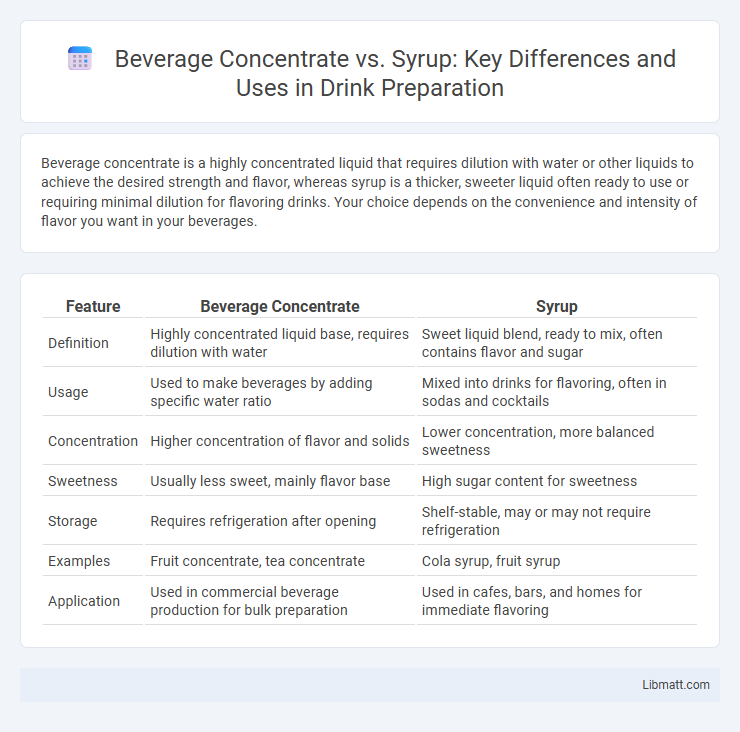Beverage concentrate is a highly concentrated liquid that requires dilution with water or other liquids to achieve the desired strength and flavor, whereas syrup is a thicker, sweeter liquid often ready to use or requiring minimal dilution for flavoring drinks. Your choice depends on the convenience and intensity of flavor you want in your beverages.
Table of Comparison
| Feature | Beverage Concentrate | Syrup |
|---|---|---|
| Definition | Highly concentrated liquid base, requires dilution with water | Sweet liquid blend, ready to mix, often contains flavor and sugar |
| Usage | Used to make beverages by adding specific water ratio | Mixed into drinks for flavoring, often in sodas and cocktails |
| Concentration | Higher concentration of flavor and solids | Lower concentration, more balanced sweetness |
| Sweetness | Usually less sweet, mainly flavor base | High sugar content for sweetness |
| Storage | Requires refrigeration after opening | Shelf-stable, may or may not require refrigeration |
| Examples | Fruit concentrate, tea concentrate | Cola syrup, fruit syrup |
| Application | Used in commercial beverage production for bulk preparation | Used in cafes, bars, and homes for immediate flavoring |
Understanding Beverage Concentrates and Syrups
Beverage concentrates are highly concentrated liquid extracts or powders made by removing water from fruit juices or other flavor bases, designed to be diluted with water or other liquids before consumption. Syrups contain concentrated sugar solutions blended with flavorings, serving as ready-to-use sweetened flavor bases that require less dilution compared to pure concentrates. Understanding the distinction between beverage concentrates and syrups helps you choose the right product for your desired sweetness, flavor intensity, and preparation method.
Key Differences Between Beverage Concentrates and Syrups
Beverage concentrates are highly concentrated liquid forms of drink bases that require dilution with water before consumption, while syrups are sweetened, flavored liquids ready to use or mix directly in beverages. Concentrates typically have a stronger flavor profile and a longer shelf life due to their higher concentration of solids and lower sugar content compared to syrups. You should choose beverage concentrate if customization and cost-efficiency are priorities, whereas syrups offer convenience and consistent sweetness for immediate use.
Ingredients Used in Beverage Concentrates vs Syrups
Beverage concentrates typically contain a higher concentration of natural ingredients such as fruit juices, pulp, and essential oils, enhancing flavor intensity while reducing volume for easy storage. Syrups generally combine sugar or high-fructose corn syrup with water and flavorings, creating a sweet, viscous base that dilutes upon mixing with water. The key distinction lies in beverage concentrates prioritizing flavor and nutritional components, whereas syrups emphasize sweetness and texture.
Preparation Methods: How They’re Made
Beverage concentrates are created by removing water from the original liquid, often through vacuum evaporation or freeze concentration, which preserves flavor intensity with minimal additives. Syrups are produced by dissolving sugar in water and blending it with flavorings, resulting in a thicker, sweeter product that is ready for direct dilution. Your choice depends on whether you prefer a pure, concentrated essence or a sweetened base for easy beverage preparation.
Flavor Profiles: Concentrates vs Syrups
Beverage concentrates typically offer a more intense and pure flavor profile due to their higher concentration of natural ingredients, making them ideal for creating bold, authentic tastes in drinks. Syrups generally contain added sweeteners and flavorings, resulting in a sweeter, more balanced flavor that can be easily diluted for a consistent taste. The choice between concentrates and syrups depends on the desired flavor intensity and sweetness level in the final beverage.
Versatility and Usage Applications
Beverage concentrate offers higher versatility in applications, enabling customization for different beverage types such as juices, teas, and cocktails by adjusting dilution levels. Syrups are primarily used for flavoring in beverages like sodas, coffee, and desserts, with a thicker consistency that limits their blending scope compared to concentrates. The choice between concentrate and syrup depends on specific production needs, desired sweetness, and intended end-use in beverage formulation.
Health Considerations and Nutritional Content
Beverage concentrates typically contain fewer additives and lower sugar levels than syrups, making them a healthier option for those monitoring caloric intake. Syrups often have high fructose corn syrup or added sugars, which can contribute to increased calorie consumption and potential negative impacts on blood sugar levels. Managing your choice between concentrate and syrup depends on your nutritional goals and health considerations related to sugar content and ingredient quality.
Shelf Life and Storage Requirements
Beverage concentrates typically have a longer shelf life than syrups due to their higher concentration and lower sugar content, reducing the risk of microbial growth. Syrups require refrigerated storage after opening to maintain freshness and prevent spoilage, while concentrates often remain stable at room temperature if sealed properly. Understanding these differences helps you optimize storage conditions and minimize product waste.
Cost Comparison: Which is More Economical?
Beverage concentrates generally offer a more economical option compared to syrups due to their higher dilution rates, reducing storage and transportation costs. Concentrates require less packaging volume and shipping weight, leading to lower expenses throughout the supply chain. Syrups, often premixed and ready-to-use, incur higher material and handling costs, making concentrates a preferred choice for bulk and commercial beverage production.
Choosing the Right Option for Your Needs
Beverage concentrate offers a more versatile and cost-effective solution for large-scale production, providing concentrated flavor and aroma with less sugar content compared to syrup. Syrup is ideal for immediate use in small batches, delivering consistent sweetness and viscosity for finished drinks without additional dilution. Selecting between concentrate and syrup depends on your operation size, desired sweetness control, and preparation time requirements.
Beverage concentrate vs syrup Infographic

 libmatt.com
libmatt.com